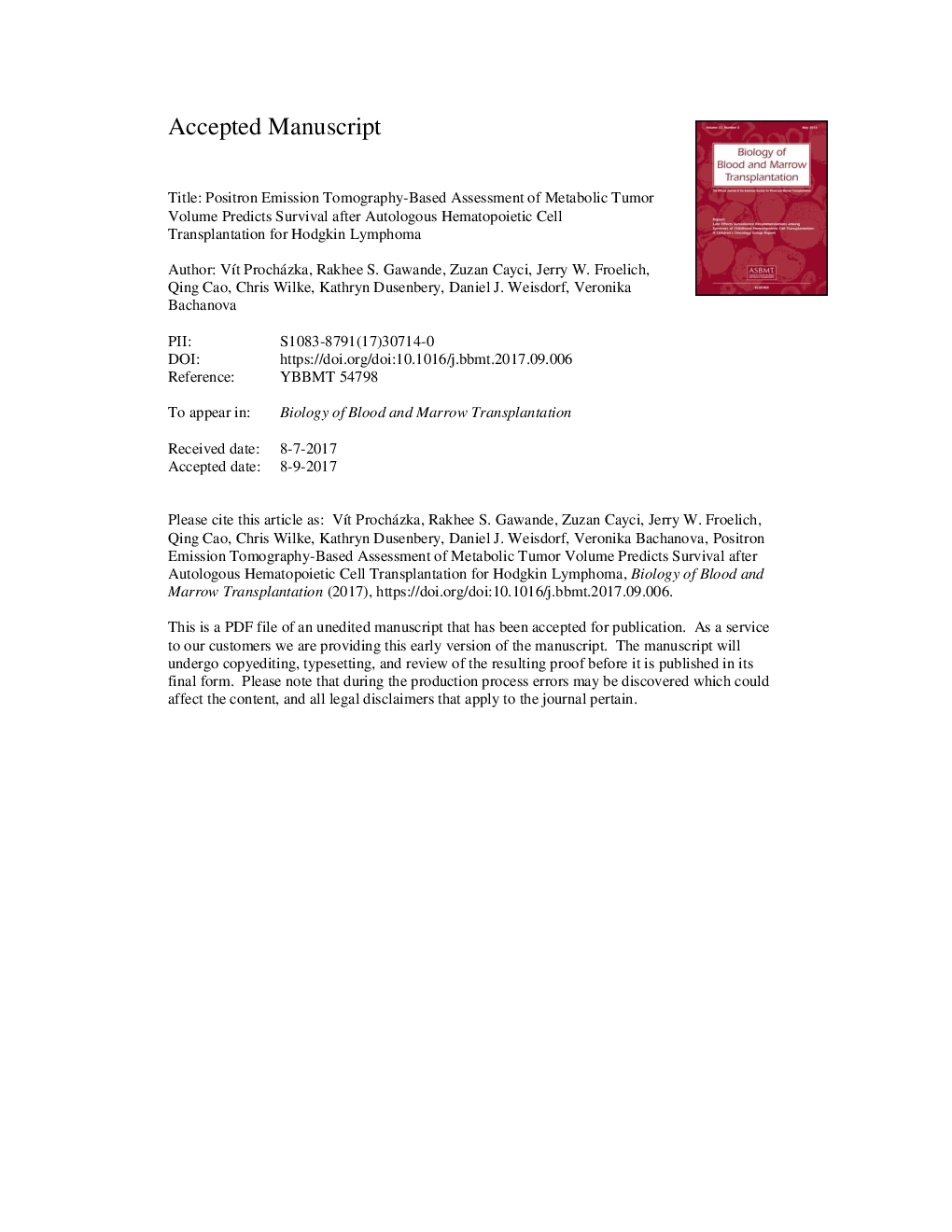| Article ID | Journal | Published Year | Pages | File Type |
|---|---|---|---|---|
| 8430517 | Biology of Blood and Marrow Transplantation | 2018 | 33 Pages |
Abstract
Autologous hematopoietic cell transplantation (AHCT) is curative for 60% of patients with relapsed or refractory Hodgkin lymphoma (R/R HL). A more precise assessment of the depth of remission before AHCT may help to identify patients likely to benefit from AHCT. We aimed to determine whether positron emission tomography (PET)-based quantitative parameters of total metabolic tumor volume (TMTV), total lesion glycolysis (TLG), and maximal standardized uptake volume (SUVmax) measured before AHCT predict progression-free survival (PFS) after transplant. Pretransplant PET/computed tomography images of 96 consecutive patients with R/R HL were analyzed. Median TMTV, TLG, and SUVmax were 7.97âcm3 (range, 1.3 to 102.1), 23.7 (range, 4.0 to 813.1), and 5.23 (range, 2.7 to 23.2). Two-year PFS in patients with high TMTV (TMTVhigh; more than median; nâ=â17) was only 12% (95% CI, 1% to 38%) compared with 53% (95% CI, 28% to 73%; Pâ=â.05) in patients with TMTVlow (lower or equal to median; nâ=â17) and 63% (95% CI, 50% to 74%) in 61 patients with no metabolically active tumor (TMTV0; Pâ>â.01). In concordance, high TLG (>19) and SUVmax (>4.9) predicted inferior 2-year PFS. In multivariate analysis patients with TMTVhigh had a 3.5-fold higher risk of treatment failure compared with TMTV0/TMTVlow (HR, 3.49; 95% CI, 1.75 to 6.93; Pâ<â.01). Deauville (D)-scores of 4 to 5 before AHCT predicted worse PFS compared with D-scores of 1 to 3 (HR, 3.7; 95% CI, 1.92 to 7.28; Pâ<â.01). Yet, TMTV and D-scores were disconcordant in 12 subjects; 9 patients in the D4 group with TMTVlow had 2-year PFS of 44% (95% CI, 14% to 72%), which was 2-fold higher than predicted by D4 score. In conclusion, in patients with R/R HL and PET-positive residual disease, TMTVhigh can identify very poor AHCT responders. Patients with TMTVlow, TLG, and SUVmax before AHCT have similar outcomes to those without metabolically active disease.
Keywords
Related Topics
Life Sciences
Biochemistry, Genetics and Molecular Biology
Cancer Research
Authors
VÃt Procházka, Rakhee S. Gawande, Zuzan Cayci, Jerry W. Froelich, Qing Cao, Chris Wilke, Kathryn Dusenbery, Daniel J. Weisdorf, Veronika Bachanova,
